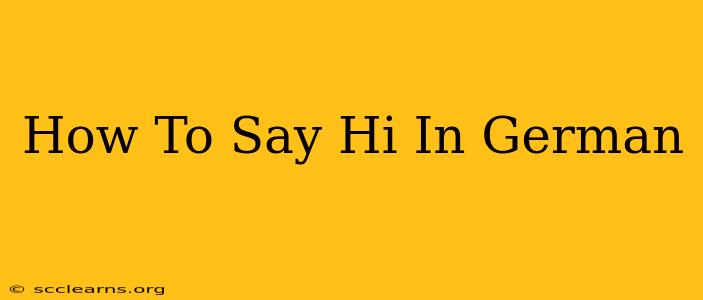Learning a new language can be exciting, and German is no exception! One of the first things you'll want to learn is how to greet people. While "Hello" works in many situations, German offers a variety of ways to say "hi," depending on the time of day, your relationship with the person, and the level of formality. This guide will cover the most common greetings, ensuring you're prepared for any German encounter.
Common Ways to Say "Hi" in German
Here are some of the most frequently used greetings in German, along with explanations to help you choose the right one:
1. Hallo (Hello):
This is the most common and versatile greeting in German. It's appropriate for almost any situation, regardless of the time of day or your relationship with the person you're greeting. Think of it as the German equivalent of "Hi" or "Hello." It's safe to use this greeting in most situations, making it a great starting point for your German learning journey.
2. Guten Morgen (Good Morning):
Use "Guten Morgen" from sunrise until about noon. It's a polite and formal greeting, suitable for both casual and professional settings. Remember to pronounce the "g" as a hard "g," like in the English word "goat."
3. Guten Tag (Good Day):
"Guten Tag" is used from roughly noon until evening. It's a more formal greeting than "Hallo," often used in professional or more formal social settings.
4. Guten Abend (Good Evening):
"Guten Abend" is used from evening onwards, typically after sunset. It's a polite and appropriate greeting for most situations during the evening hours.
5. Servus (Hi/Bye):
"Servus" is a more informal and regional greeting, commonly used in Southern Germany and Austria. It's a versatile word that can be used as both a greeting and a farewell.
Beyond the Basics: Informal Greetings
For close friends and family, you can use even more informal greetings:
- Hey: While not a German word, "Hey" is commonly understood and used, especially amongst younger generations.
- Hi: Similar to "Hey," "Hi" is also frequently used informally.
Choosing the Right Greeting: Formality Matters
German culture places a strong emphasis on formality. Using the wrong greeting can sometimes be perceived as rude or disrespectful. When in doubt, err on the side of formality. "Hallo," "Guten Morgen," "Guten Tag," and "Guten Abend" are generally safe choices in most situations.
Mastering the Pronunciation
While the written words are relatively straightforward, correct pronunciation is key to sounding natural. Utilize online resources, such as audio pronunciation guides, to ensure you're pronouncing these greetings correctly. Practice makes perfect!
Expanding Your German Vocabulary
Learning these basic greetings is just the first step. As you continue your German language journey, explore other common phrases and expressions to further enhance your communication skills. With consistent effort and practice, you’ll soon be confidently navigating conversations in German.
Conclusion:
Learning how to say "hi" in German opens doors to communication and cultural understanding. Mastering these greetings, and understanding their context, will help you build stronger connections with German speakers. So, go forth and Hallo to the world!

